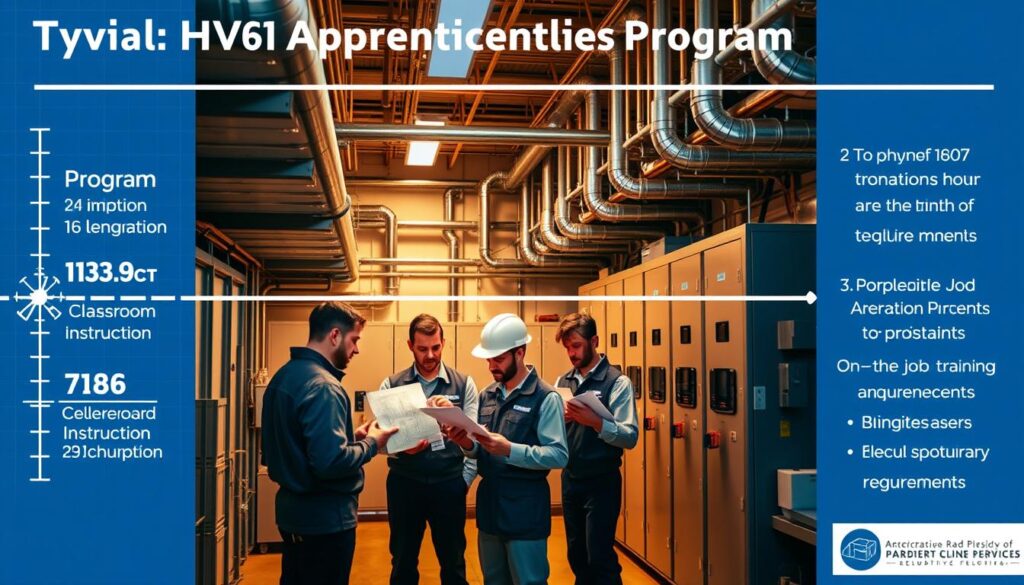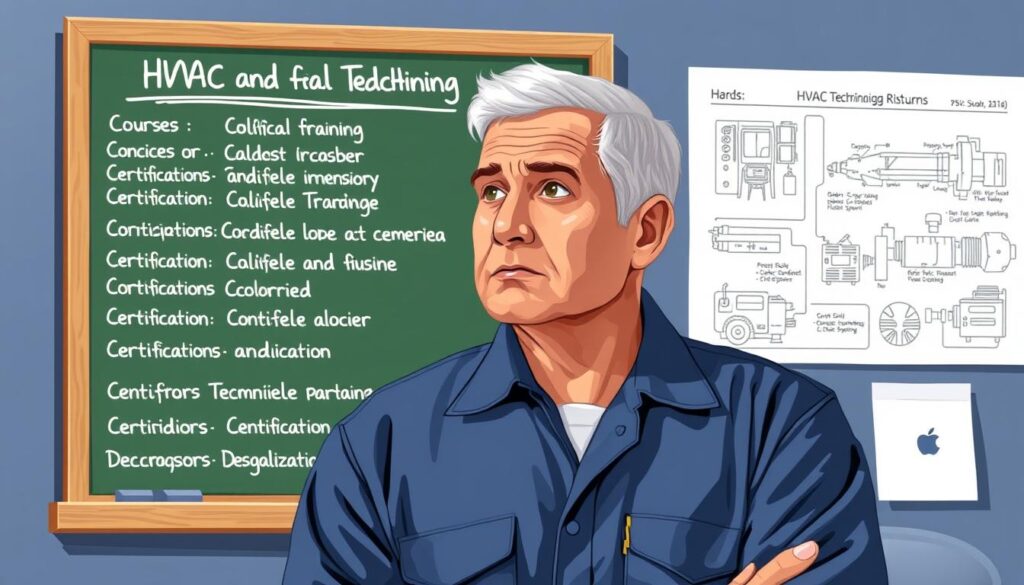How Long is an HVAC Apprenticeship? Are you curious about turning your technical skills into a solid career? An HVAC apprenticeship could be your ticket to a stable and rewarding job.

HVAC training usually takes 3 to 5 years. It’s a journey from beginner to skilled technician. You’ll learn both practical skills and theory, preparing you for a career in heating, ventilation, and air conditioning.
Your apprenticeship is more than a job. It’s a deep dive into learning, where you work with experienced pros. You’ll master complex systems and develop key technical skills. Most programs need 2,000 to 3,000 hours of hands-on training, making sure you’re ready for real-world challenges.
Key Takeaways
- HVAC apprenticeships last 3-5 years
- Requires 2,000-3,000 hours of on-the-job training
- Provides complete technical education
- Offers structured learning with experienced professionals
- Prepares you for a stable technical career
Table of Contents
Understanding HVAC Apprenticeships: A Career Gateway
An HVAC apprenticeship is a great way to start a technical career. It combines hands-on experience with classroom learning. This is the first step in your journey in the HVAC field.
The length of an HVAC apprentice program is carefully planned. It usually lasts four years. During this time, you’ll get both on-the-job training and classroom lessons.
What Makes HVAC Apprenticeships Unique
HVAC apprenticeships are special because they offer real-world learning. You’ll work with experienced technicians and earn money while you learn. The program includes:
- Hands-on training with experienced technicians
- Structured classroom education
- Gradual skill progression
- Direct industry exposure
Key Benefits of Starting as an Apprentice
Choosing an HVAC apprenticeship has many benefits:
- Earn while you learn
- Gain practical industry experience
- Potential college credit transferability
- Clear career advancement path
“An HVAC apprenticeship is not just a job—it’s a strategic career investment.” – Industry Expert
Essential Requirements for Entry
To start this exciting career, you need to meet certain requirements:
- Minimum age: 18 years old
- High school diploma or GED
- Physical fitness for technical work
- Passing required aptitude tests
The HVAC workforce development program prepares you for a successful career. It offers a structured way to become a skilled professional.
Explore Our HVAC Shop
Looking for top-rated HVAC tools, parts, and accessories? Visit our shop and find the perfect solution for your needs.
Visit the ShopHow Long is an HVAC Apprenticeship
Starting an HVAC apprenticeship is a big step. It needs careful planning and a lot of dedication. The training usually lasts between 3 to 5 years. This gives you a solid foundation to become a skilled technician.
During your apprenticeship, you’ll follow a structured learning path. The training includes:
- Extensive on-the-job training (2,000 to 3,000 hours)
- Classroom instruction (approximately 600 classroom hours)
- Practical skill development
- Technical knowledge acquisition
There are different ways to start an HVAC career. Apprenticeships last 3-5 years. But, you can also choose:
- Certificate programs: 6-12 months
- Associate degree: 2 years
- Bachelor’s degree: 4 years
The length of your apprenticeship depends on several things. These include your location, the program’s requirements, and how fast you learn. Each year adds to your skills in heating, ventilation, and air conditioning.
Patience and persistence are key to successfully completing an HVAC apprenticeship.
Investing time in your apprenticeship can lead to a rewarding career. HVAC technicians earn an average of $59,620 in 2023. The long training is worth it for those serious about this trade.
Explore Our HVAC Shop
Looking for top-rated HVAC tools, parts, and accessories? Visit our shop and find the perfect solution for your needs.
Visit the ShopThe Structure of HVAC Apprenticeship Programs
HVAC apprenticeship programs offer a detailed path for learning heating, ventilation, and air conditioning skills. They mix practical experience with classroom learning. This creates HVAC experts who are well-rounded.
Your HVAC skill development will follow a balanced plan. It combines hands-on training with learning from books. Apprentices go through a long program. This ensures they learn everything they need to know.
On-the-Job Training Components
The practical part of HVAC training is all about real-world experience. Apprentices will:
- Work with skilled HVAC technicians
- Do 2,000 to 3,000 hours of training each year
- Learn how to install, maintain, and fix systems
- Get better at solving problems in different settings
Classroom Education Requirements
Classroom learning adds to the practical training. It includes:
- 216 hours of technical classes each year
- Lessons on electrical systems
- How HVAC systems are designed
- Rules for safety
Skills Development Timeline
Your apprenticeship will grow your skills in stages. You’ll start with simple tasks and move to harder technical skills.
By the end, you’ll have about 8,000 hours of on-the-job training. You’ll also have a lot of book knowledge. This makes you a skilled HVAC pro ready for certification and to move up in your career.
HVAC Apprentice Salary Expectations
Exploring an HVAC apprenticeship means looking at your future earnings. The hvac workforce development offers good financial chances for those who learn new skills.
Starting salaries for HVAC apprentices are between $26,000 and $43,000 a year. Your first salary depends on several things:
- Where you live
- Whether it’s a union or non-union apprenticeship
- The demand for HVAC workers in your area
- Your skills and how well you do
HVAC apprentices usually make about $16.38 an hour. As you get more experience, your pay will go up. Apprentices typically make half of what a fully qualified technician makes, but they can earn more as they gain experience.
Wages usually go up in a certain order:
- First-year apprentices: Lowest pay
- Second-year: A bit more money based on skills
- Third-year: A big pay increase
- Fourth-year: Almost as much as a journeyman
Union apprenticeships usually have clearer pay scales than non-union ones. This can help you know how much you’ll make as you learn.
Investing in an HVAC apprenticeship means investing in your future earning power.
Explore Our HVAC Shop
Looking for top-rated HVAC tools, parts, and accessories? Visit our shop and find the perfect solution for your needs.
Visit the ShopYear-by-Year Progression in HVAC Training
Your HVAC journeyman apprenticeship is a journey of learning and growth. It usually lasts 3 to 5 years. Each year, you’ll learn more and gain practical experience.
As you go through your apprenticeship, you’ll grow from a beginner to a skilled worker. Here’s how your skills and duties will change:
First Year Fundamentals
In your first year, you’ll learn the basics:
- Basic tool identification and usage
- Safety protocols and workplace regulations
- Introduction to HVAC systems
- Learning basic terminology
In the first year, you’ll earn about $15 per hour. Your pay will go up as you get better.
Advanced Skills Development
As you move forward, your tasks and technical skills will get more complex. By the second and third years, you’ll learn:
- Advanced system diagnostics
- Refrigeration system understanding
- Complex installation techniques
- Electrical system knowledge
After six months, your pay can jump to $20.51 an hour. This shows your growing skills.
Final Year Mastery
In your last year, you’ll almost be on your own. You’ll learn:
- Independent system design
- Complex troubleshooting
- Client communication
- Project management
By the end, you could earn $24.74 per hour. You’ll be ready to become a fully qualified HVAC technician.
| Apprenticeship Year | Key Skills | Average Hourly Wage |
|---|---|---|
| Year 1 | Basics, Safety, Tool Use | $15.00 |
| Year 2-3 | Advanced Diagnostics, System Understanding | $20.51 |
| Year 4-5 | Independent Work, Complex Troubleshooting | $24.74 |
Educational Requirements and Prerequisites

Starting a career as an HVAC technician requires understanding the basics. Most employers look for candidates with a solid educational background. This is to join HVAC apprenticeship programs.
First, you need a high school diploma or GED. This shows you’re ready for technical training in HVAC.
Key Prerequisites for HVAC Apprenticeships
- High school diploma or equivalent
- Minimum age requirement of 18 years old
- Valid driver’s license
- Passing basic math and aptitude tests
- Physical fitness for demanding fieldwork
The path to becoming an HVAC technician involves several steps. About 85% of apprenticeship programs require a high school diploma. This makes education a key starting point for aspiring technicians.
Additional Qualification Recommendations
While a diploma is the minimum, some candidates do more. They:
- Complete vocational training programs
- Get technical certifications
- Show strong math and problem-solving skills
- Have mechanical aptitude from previous experiences
About 40% of HVAC technicians get more education, like associate degrees. This can help them move up in their careers and earn more.
Preparation is key to success in the competitive HVAC industry.
Your HVAC career starts with meeting these educational needs. It shows your dedication to professional growth.
Explore Our HVAC Shop
Looking for top-rated HVAC tools, parts, and accessories? Visit our shop and find the perfect solution for your needs.
Visit the ShopFinding and Securing an HVAC Apprenticeship
Starting your HVAC career needs careful planning and knowing how to find apprenticeships. The world of HVAC trade schools and workforce development can be tough to navigate. But, with the right steps, you can find an apprenticeship.
In 2021, over 241,000 apprentices joined the national apprenticeship system. This shows there’s a big need for skilled technicians. Your first step is to learn about the different programs out there.
Union vs. Non-Union Programs
HVAC apprenticeships are mainly in two types:
- Union Programs: They offer structured training with a set curriculum
- Non-Union Programs: These have more flexible training through local companies or schools
Application Process Steps
- Look for local HVAC companies and training centers
- Check if you meet the basic requirements (usually 18 years old with a high school diploma)
- Get your documents ready
- Apply to several programs
- Be ready for entrance exams or interviews
Required Documentation
| Document | Purpose |
|---|---|
| High School Diploma/GED | Proof of basic education |
| Government-issued ID | Verification of identity |
| Driving Record | Demonstrates reliability |
| Physical Fitness Certificate | Confirms ability to perform job requirements |
Being thorough in your preparation will greatly improve your chances of getting an HVAC apprenticeship. This will help you start a rewarding career in this exciting field.
Career Advancement After Apprenticeship

After finishing your HVAC apprenticeship, many career paths open up. The hvac skill development pathways offer various ways to grow and specialize. Your apprenticeship timeframe is the start of a strong and exciting HVAC career.
Technicians can move through several career stages:
- Journeyman Status: Achieving full professional certification
- Specialized Technical Roles
- Independent Contractor Opportunities
- Management and Supervisory Positions
Choosing a specialization is key for moving up. You might focus on areas like:
- Commercial HVAC Systems
- Residential Installation
- Industrial Refrigeration
- Energy Efficiency Consulting
“Continuous learning and skill development are the keys to success in the HVAC industry.” – Professional HVAC Association
Your salary will increase with experience. New technicians start at about $32,175 a year. Experienced ones can make up to $50,331 annually.
| Career Stage | Average Annual Salary |
|---|---|
| Apprentice | $34,073 |
| Journeyman | $51,390 |
| Senior Technician | $69,540 |
Improving your skills can speed up your career. Getting better at customer service, solving technical problems, and keeping up with new tech will make you stand out in the HVAC field.
Explore Our HVAC Shop
Looking for top-rated HVAC tools, parts, and accessories? Visit our shop and find the perfect solution for your needs.
Visit the ShopState-Specific Requirements and Licensing
Getting an hvac technician certification can be tricky because each state has its own rules. It’s important for those starting in HVAC to know these differences. This knowledge helps in building a strong career in the field.
Your training needs for an hvac career depend on your location. States have different rules that affect how you get certified or licensed. For instance:
- California requires a C-20 HVAC license for work over $500
- Florida has four HVAC contractor license classes
- Texas has three main licenses: registered technician, certified technician, and contractor’s license
Important things to consider for licensing include:
- Minimum age (usually 18 years old)
- Education (high school diploma or equivalent)
- Work experience proof
- Passing a state-specific licensing test
The HVAC industry is expected to grow 4% by 2029. Most states require passing a big licensing test before you can work on your own. Getting an HVAC license can cost a few hundred to several thousand dollars, based on state rules.
Some states like Illinois and Pennsylvania don’t have statewide licensing. But, local areas might have their own rules. Always check your state’s specific rules to follow them and move forward in your career.
Conclusion
Starting an HVAC career through an apprenticeship is a great way to grow professionally. It usually takes 3 to 5 years, giving you deep skills and real-world experience. Knowing how long an HVAC apprenticeship lasts helps you plan your career better.
Your path will mix hands-on training with classroom learning. This way, you’ll get both technical skills and problem-solving abilities. Apprenticeships give you practical knowledge that books can’t match. This training makes you stand out in the HVAC field.
Seeing an apprenticeship as an investment in your future is wise. The training is tough but prepares you for a rewarding career. You can choose from union or non-union programs, and your hard work will pay off.
Your hard work during training will lead to a strong career. You’ll have chances to specialize, earn more, and find true fulfillment. Start now and turn your technical skills into a successful HVAC career.

